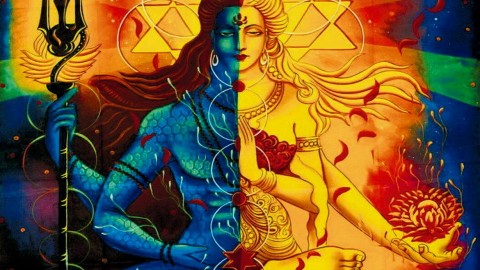Half Truth – In Gita Verse 1.39 With the destruction of the dynasty, the eternal family tradition is vanquished, and thus the rest of the family becomes involved in irreligion.
Arjuna stands on the battlefield of Kurukshetra, enveloped by the tumult of impending conflict. He envisions the demise of his lineage and a post-war era where the fabric of tradition and righteousness appears to unravel within his surviving kin. While his foresight is rooted in logic, it risks neglecting the expansive and intricate design of life and the universe.
The analytical mind, skilled at dissection and differentiation, falls short in embracing the totality of existence. Fragmentation of experience is its nature, yet it fails to see the interconnectedness of those fragments. It is here, in the partition of wholes into parts, that logic reveals its limitations. The totality of existence remains elusive, beyond the scope of pure rationalisation. Therefore, Arjuna, much like any one of us, risks being led astray through overly simplistic deductions. He perceives the war as a terminus – the obliteration of his house, the cessation of dharma. This rush to finality, however, signifies a descent into unconsciousness – a withdrawal from the cosmic rhythm and life’s divine blueprint. It’s precisely within this precipice of the unknown that Arjuna’s inward odyssey to discover his authentic self and his contribution to the cosmos can truly commence.
To acknowledge not-knowing is to enter a realm abundant in subjectivity, permitting the individual not only to partake in but also to shape the universal narrative. It allows Arjuna to dwell in a space rich with intuition, insight, and spiritual wisdom, far beyond the grasp of mere logic.
This awakening summons Arjuna to relinquish his presuppositions and the false security of ego-centric conclusions. He is implored to adopt an attitude of profound humility and to accept that the finite intellect is no match for the cosmos’ infinite complexities. Such surrender uncovers a deeper interpretation of his dharma – not as strict, predetermined duties but rather as vibrant, dynamic participation in the divine.
Arjuna’s journey thus becomes deeply private, a venture compelling confrontation with both the shadows and the light within, where the inner world mirrors the vastness of the cosmos. In so accepting, Arjuna, paralleling every spiritual aspirant, must release the deceptive assurance proffered by partial truths to embrace the transformative power inherent in the acceptance of all that is.
This acceptance of uncertainty paves a path to a more profound connection with the Self and, consequently, with the complex fabric of existence. Arjuna’s sincerity and openness allow his genuine subjectivity to manifest, guiding his deeds and aligning him with the universal will and absolute truth.
Let us reflect upon the simple yet profound example of a seed. Just as Arjuna contemplates the seed, failing to perceive within it the latent splendour of the future tree, so he grapples with comprehending the true outcome of war, confined by his present perception. As the mightiest of trees lie dormant within the smallest of seeds, existence undulates between emergence and dissolution, a rhythm as perennial as the cosmos itself.
Arjuna’s focus is riveted to the tangible – existence in form – overlooking that this form is but a sliver of the entire reality. To cling only to the perceivable is to dance in illusion, to be taken in by the play while disregarding the mystery of the unseen.
In the context of illusion, ignorance is not the absence of knowledge but the state of knowing only partially. Even the oblivious hold shards of wisdom. Yet half-truths – deceivingly similar to full truths – entrap more securely than outright fallacies. They are the most challenging illusions to dispel due to their veneer of credibility. Like severing a truth, one cannot divide love, theft, or any act without losing its intrinsic nature.
Choosing single facets of life – joy without acknowledging pain, embracing birth yet denying death – is to wander amidst mirages. These dualities, inseparable and complementary, necessitate acceptance in their entirety to avert an existence fraught with illusion.
Arjuna, viewing his predicament through the lens of half-truths, perceives only devastation, a lost legacy, and a desolate future stripped of virtue. In doing so, he neglects the universal charge entrusted to him. The essence of dharma – action undertaken without malice and a dissociation from the ego – emerges as the pivotal element of righteousness. In grasping this, those who live beyond the war can indeed lead lives of virtue.
Therefore, Arjuna’s misstep, as this verse illustrates, is his adherence to a partial representation of reality. The higher truth resides in fulfilling one’s sacred obligations with detachment, acting as an instrument for the divine. Embracing this viewpoint sheds light on the path of righteousness for those who remain, ensuring the perseverance of dharma amid the upheaval of war and its aftermath.
Tags: Half Truth




